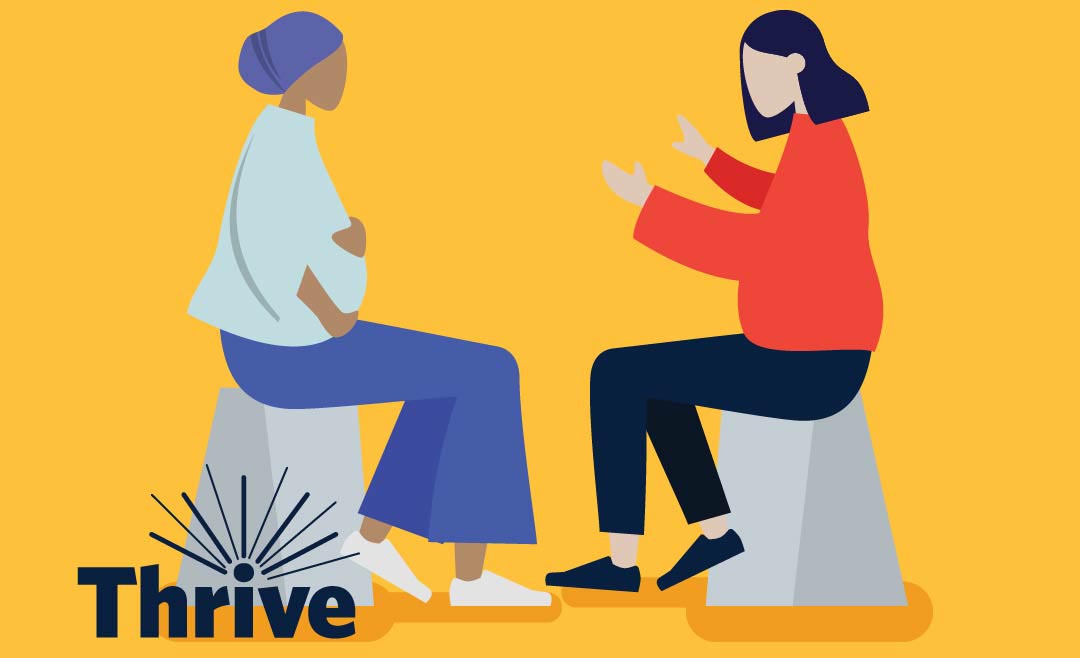We all have mental health—it’s our feelings, emotions, thoughts, and mood—and we can all take steps to support it.
There are small steps that you can integrate into your day—like moving more, eating well, connecting with others, getting enough rest, or volunteering your time—to help support your mental health. At UBC, we call these the Thrive 5. For some, additional activities that you love like music, art, worship, or meditation might be what makes you feel good and helps you deal with life’s everyday challenges.
But sometimes this isn’t enough. And it's ok (and important) to ask for help when you need it.
Asking for help with your mental health may not feel easy. You might have had times where you feel sad, or anxious, or down in the past, or it might be ongoing. Other times, you might just not feel like yourself. You may have had help and support with your mental health in the past, or you may be experiencing mental health challenges for the first time.
One in five Canadians will experience a mental health illness or problem each year. Mental health can have a huge impact on your overall wellbeing—which can also impact your studies, your work, your relationships, or your enjoyment of everyday life.
That's why it's important to:
- Recognize the signs something might not be right
- Identify any barriers to seeking help
- Take your next step and talk about it with someone
Recognize the signs something might not be right.
It’s ok (and important) to ask for support.
Like your physical health, your mental health matters, and needs care and attention; to do well, you have to be well. If you weren’t feeling physically well, you’d let people know. It is especially important to reach out for help if you’re having difficulty coping with a mental health concern. There are many reasons why someone might hesitate to seek help. It can sometimes be difficult or uncomfortable to start a conversation, but it is better than struggling alone.
Some common reasons you may not seek help:
Take your next step and talk about it with someone
Mental health is different for everyone and what works to support some people may not work for others. You're in control when it comes to choosing the resources and supports that work best for you and that you’re most comfortable with.
Think about the next step that you’re comfortable with. You might start by reaching out to a family member, elder, teacher, friend, or community member first. You might also want to speak to a trained student peer who will listen, or you might want to look for professional support, like a counsellor, nurse, or doctor. You may need to try talking to a few different people or resources before you find the one that helps you thrive.
There is no one way to look for and receive support for mental health. It is part of the journey towards fostering and maintaining mental health. Asking for help is the first step.
Supporting those in distress
It can be difficult to know how to bring up concerns about a friend, student, or colleague's mental health but it all starts with recognizing the signs and having a conversation. There are resources available to support you with this:
Helping Faculty and Staff in Distress
- View the UBC Orange Folder: A printable guide for helping colleagues in distress.
Assisting Students in Distress
- View the UBC Vancouver Green Folder and UBC Okanagan Blue Folder: Printable guides for helping students in distress.
- Student Health Services: Help a Friend
- Wellness Centre Online: Learn more about how to help a friend in distress by reviewing the Noticing a Friend May Need Help module.
Suicide Awareness & Intervention Training (SAIT)
In response to the needs of our campus community, UBC has transitioned from the QPR program and has created the custom Suicide Awareness and Intervention Training (SAIT) that is from a post-secondary context, is trauma-informed, and has cultural context.
This is a free, introductory course for any UBC Vancouver and Okanagan students, faculty, staff and alumni. There are no prerequisites; while training will give you skills to help someone, you’re not expected to become an expert.
Need help now?
If you are in need of emergency support, reach out and call 1-800-784-2433
Need help now? Help is available 24 hours a day, 7 days a week.
Call 1-800-784-2433 for the BC Crisis Line or call or text 9-8-8 for the Canada-wide Suicide Crisis Helpline toll-free.
Who can I ask for help?
Your first step towards seeking help may not be a professional counselor or doctor; in fact for many people, it starts with reaching out to someone they are comfortable with. This might be:
- A trusted friend, family member, or colleague
- A pastor, chaplain, or spiritual leader
- A peer support, such as AMS Peer Support


